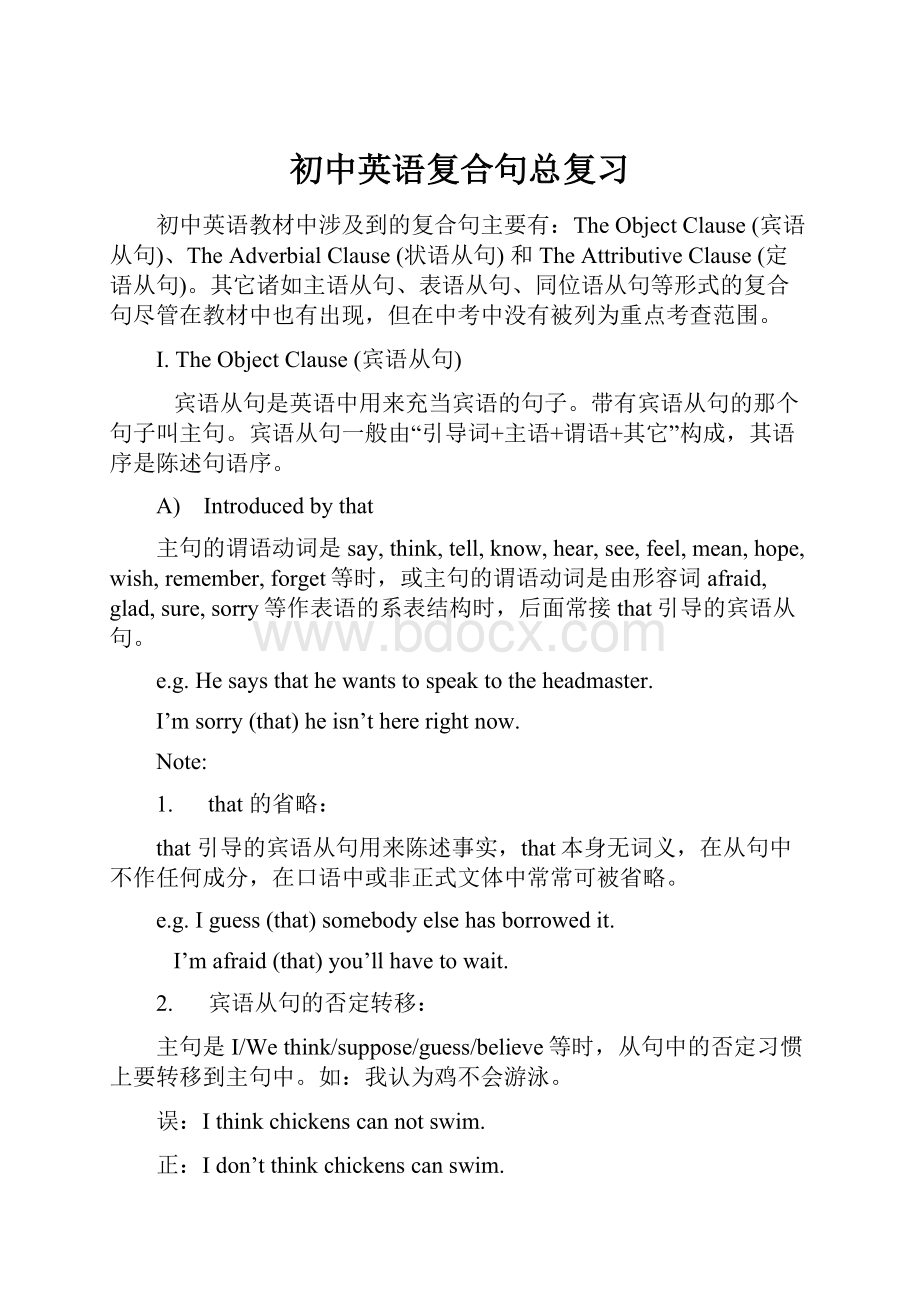 初中英语复合句总复习.docx
初中英语复合句总复习.docx
- 文档编号:9766926
- 上传时间:2023-02-06
- 格式:DOCX
- 页数:16
- 大小:24.78KB
初中英语复合句总复习.docx
《初中英语复合句总复习.docx》由会员分享,可在线阅读,更多相关《初中英语复合句总复习.docx(16页珍藏版)》请在冰豆网上搜索。

初中英语复合句总复习
初中英语教材中涉及到的复合句主要有:
TheObjectClause(宾语从句)、TheAdverbialClause(状语从句)和TheAttributiveClause(定语从句)。
其它诸如主语从句、表语从句、同位语从句等形式的复合句尽管在教材中也有出现,但在中考中没有被列为重点考查范围。
Ⅰ.TheObjectClause(宾语从句)
宾语从句是英语中用来充当宾语的句子。
带有宾语从句的那个句子叫主句。
宾语从句一般由“引导词+主语+谓语+其它”构成,其语序是陈述句语序。
A) Introducedbythat
主句的谓语动词是say,think,tell,know,hear,see,feel,mean,hope,wish,remember,forget等时,或主句的谓语动词是由形容词afraid,glad,sure,sorry等作表语的系表结构时,后面常接that引导的宾语从句。
e.g.Hesaysthathewantstospeaktotheheadmaster.
I’msorry(that)heisn’thererightnow.
Note:
1. that的省略:
that引导的宾语从句用来陈述事实,that本身无词义,在从句中不作任何成分,在口语中或非正式文体中常常可被省略。
e.g.Iguess(that)somebodyelsehasborrowedit.
I’mafraid(that)you’llhavetowait.
2. 宾语从句的否定转移:
主句是I/Wethink/suppose/guess/believe等时,从句中的否定习惯上要转移到主句中。
如:
我认为鸡不会游泳。
误:
Ithinkchickenscannotswim.
正:
Idon’tthinkchickenscanswim.
此外,上述情况在变成反意疑问句时,附加疑问句要看从句,如果主句的主语不是第一人称,则附加疑问句要看主句。
试比较:
Ithinkheiswrong,isn’the?
Hethinksheisright,doesn’the?
B) Introducedbyif/whether
if/whether都可作宾语从句的引导词,意为“是否”,在一般情况下可以互换。
if多用于口语和非正式文体中,whether则多用于比较正式的文体中。
如:
e.g.Sheaskedmeif/whetherIcouldhelpherwithherEnglish.
Idon’tknowif/whetheritisgoingtorain.
Note:
只用whether的六种情况:
1. 在带to的动词不定式前
Hedoesn’tknowwhethertogotothecinemaortowatchTVathome.
2. 在介词后
I’mthinkingofwhetherweshouldgofishing.
3. 直接与ornot连用时
Idon’tknowwhetherornottheywillcometohelpus.
4. 在动词discuss后面的宾语从句中
Wediscussedwhetherwouldhaveasportsmeetingnextwek.
5. 宾语从句提前时只能用whether
Whetherthisistrueornot,Ican’tsay.
6. 引导位于句首的主语从句或表语从句用whether
Whetherheisrightorwrongisaquestion.
C)Introducedbyrelativepronounsandadverbs(连接代词和连接副词)
一、构成:
1.宾语从句可由连接代词what,who,whom,which等引导,它们在宾语从句
中可作主语、宾语、表语和定语等,因此不能省略。
Doyouknowwhowillcomethisafternoon?
(作主语)
Didyouhearwhathesaid?
(作宾语)
Idon’tknowwhosethatis.(作表语)
Couldyoutellmewhichgatewehavetogoto?
(作gate的定语)
2.宾语从句可由连接副词when,where,how,why等引导,它们在宾语从句
中作状语,不可省略。
Wedidn’tknowwhenshewouldcomeback.
CouldyoutellmehowIcangettothepostoffice?
Nooneknowswhysheislateagain.
二、难点:
1.避免重复出现连接代词或连接副词;
e.g.*Ican’tseethatwhatisoverthere.(应去掉that)
2.从句中的语序为陈述语序;
e.g.*Doyouknowhowoldisshe?
(应改为:
…howoldsheis)
3.从句中的时态与主句时态前后呼应。
e.g.*Shedidn’ttellmewhenshewillcome.(应改为:
…whenshewouldcome)
三、转换:
由连接代词和连接副词引导的宾语从句可用疑问代词和疑问副词+动词不定式替代,进行句型上的转换。
e.g.I’venoideawhatwe’regoingtodonext.=I’venoideawhattodonext.
CouldyoutellmehowIcangettothepostoffice?
=Couldyoutellmehowtogettothepostoffice?
难点:
宾语从句的时态
主句中谓语动词是一般现在时,从句中谓语动词的时态不受限制,可根据具体情况选用适当的时态;主句谓语动词是一般过去时,从句中也必须要用某种过去时态,以保持时态的前后呼应。
特别要注意的是当宾语从句表示的是客观真理、科学原理、自然现象、名言时,则用一般现在时,不受主句时态的限制。
试比较:
Hesaysthathewantstoseehimassoonaspossible.
Hesaidthathewantedtoseehimassoonaspossible.
Tomsaysthatheismendinghiscar.
Tomsaidthathewasmendinghiscar.
Theteachertoldusthattheearthgoesroundthesun.
宾语从句中考题练兵:
一、单项选择
( )1.Idon’tthinkhewillcomehereontime, ?
(重庆)
A.won’the B.willhe C.doeshe D.ishe
( )2.Willyoupleasetellme ?
(上海)
A.wherePudongAirportis B.howfarPudongAirportwas
C.howcanwegettoPudongAirport D.whenwasPudongAirportbuilt
( )3.It’snotpolitetoaskpeople inEngland.(常州)
A.howmuchmoneyyouhavegot B.whattheweatherislike
C.whatyourcitylookslike D.howoldareyou
( )4.Iwonderifhe tonight.Ifhe ,I’llletyouknow.(扬州)
A.willcome;willcome B.comes;comes
C.willcome;comes D.comes;willcome
( )5.Ican’tsay Iwanttoseehimagain.Wehaven’tseeneachotherfornearlythreeyears.(镇江)
A.howlong B.howsoon C.howoften D.howmuch
( )6.Mr.Greentoldmethathe onatripnextSunday.(通化)
A.aregoing B.wasgoing C.willgo D.wouldgoing
( )7.OurgeographyteachertoldusthatJapan theeastofChina.(河北)
A.isin B.wasin C.isto D.wasto
( )8.Nobodyknows he’llcomeornot.(辽宁)
A.that B.if C./ D.whether
二、按要求改写句子
1. “Doyouwanttotrysomethingnew?
”Tom’smotheraskedhim.(改为复合句,句意不变)(济南)
Tom’smotheraskedhim totrysomethingnew.
2. Couldyoutellmethewaytothestation?
(改写句子,句意不变)(青岛)
Couldyoutellme tothestation?
3. “Ihavefinishedmyhomework.”Johntoldme.(改为复合句,句意不变)(天津)
Johntoldmethat homework.
4. Idon’thowIcanreachthezoo.(改为简单句)(宿迁)
Idon’tknow thezoo.
三、根据汉语提示,完成句子.
1. 我还没有决定是否去参加迈克的生日聚会。
(黑龙江)
Ihaven’tdecided IwillgotoMike’sbirthdayparty .
2. 张清问他奶奶还要些面条。
(西安)
ZhangQingaskedhisgrandma she noodles.
3. 据说在南京长江上又建了一座桥。
(南京)
that bridge overtheChangjiangRiverinNanjing.
4. 请你告诉我这把锁是用什么制成的好吗?
(无锡)
Wouldyoupleasetellme ?
5. 你能告诉我他从美国回来多久了?
Canyoutellme ?
Ⅱ.TheAdverbialClause(状语从句)
状语从句是副词性从句,其句法功能是修饰谓语或整个句子等,在句中作状语,通常由从属连词引导。
A) TheAdverbialClauseofTime(时间状语从句)
1)Introducedbywhen
(表示主句的动作和从句的动作同时或先后发生,意为“当…..时”。
)
e.g.Whenyougetoffthebus,youmustn’tpushothers.
2)Introducedbybefore
(表示主句发生的动作发生在从句动作之前,意为“在……之前”。
)
e.g.Don’tsayanythingbeforeyoulookatthepicture.
3)Introducedbyafter
(表示主句发生的动作发生在从句动作之后,意为“在……之后”。
)
e.g.Theytalkedaboutthepartyafterthepeopleleft.
4)Introducedbyuntil
(表示主句发生的动作发生在从句动作之前,意为“直到……为止”。
主句用肯定式,谓语是延续性的动词,表示动作一直延续到until所表示的时间为止)
e.g.Iwillwaituntilhecomes.
Note:
(until用于否定句时,主句的动作发生在从句的动作之前,并且谓语动词是非延续性动词,表示某一动作到until所表示的时间才发生。
not…untill
意为“直到……才……”。
)
e.g.Shewon’tgotobeduntilshefinishesherhomework.
5)Introducedbyassoonas
(表示主句发生的动作发生在从句动作之后,意为“一……就”。
)
e.g.MybrotherwentoutassoonasIgothome.
Note:
在时间状语从句中,主句和从句之间的时态应按下列规律确定。
1)主句一般将来时,从句用一般现在时:
e.g.Theboywillbeawriterwhenhegrowsup.
2)主句含有情态动词,从句用一般现在时:
e.g.Whenthelightsarered,thetrafficmuststop.
3)主句为祈使句时,从句用一般现在时:
e.g.Pleasedon’tgotobedbeforeyoufinishyourhomework.
4)主句为一般过去时,从句也用过去时态:
e.g.IlikedreadingwhenIwasyoung.
B) TheAdverbialClauseofPlace(地点状语从句)
1)Introducedbywhere
e.g.Putthemedicinewhereyoucaneasilygetit.
2)Introducedbywherever
e.g.I’llgowhereveryougo.
C) TheAdverbialClauseofManner(方式状语从句)
1)Introducedbyas
e.g.I’lldoallthethingsasyoutoldme.
2)Introducedbyasif/though(可用陈述语气表示符合事实的情况,也可用虚拟语气表示与事实相反的情况)
e.g.Itlooksasifit’sgoingtorain.
Helooksasifhewereyoung.
3)Introducedbytheway
e.g.Idon’tlikethewayhetalks.
D) TheAdverbialClauseofReason(原因状语从句)
1)Introducedbybecause
because语气最强,它着重说明原因。
用why提问的问句必须用because回答,不能用as,since;
e.g.--Whydidn’thecome?
--Becausehewasill.
2)Introducedbysince
since语气比较弱,表示关系上的自然结果,尤其用于对已经清楚了的因素,常译成“既然”,“鉴于”,通常从句放在主句前;
e.g.Sincealotofpeoplemakemistakesinlife,MrSmithwantedtogiveJohnachance.
3)Introducedbyas
as语气最弱,只表示一般的因果关系,从句放在主句前或后均可;
e.g.Ashedidn’tknowthemeaningoftheword,helookeditupinhisdictionary.
Note:
for是并列连词,引导的句子不置于句首,是一种非直接的、随便附加说明的理由或推断。
e.g.Theoilmustbeout,forthelightwentout.
E) TheAdverbialClauseofCondition(条件状语从句)
1)条件状语从句通常由if或unless(=ifnot)引导,从句中常用一般时代替将来时,即if或unless后的句子谓语用一般现在时或一般过去时。
但是,主句则通常用将来时,情态动词或祈使句。
e.g.Ifhedoesn’tcomeontime,wewon’tknowwhattoknow.
Hemustcomeifheistold.
Pleaseletmeknowifhecomesback.
I’llgothereunlessitrains.
2)If条件句的替代形式:
(1)祈使句+and/or+陈述句(谓语动词通常用将来时态)。
其中,and表示句意顺承;or表示转折,意为“否则”。
e.g.Ifyouworkhard,you’llpasstheexameasily.=Workhard,andyou’llpasstheexameasily.
Ifyoudon’tworkhard,you’llfallbehindothers.=Workhard,oryou’llfallbehindothers.
(2)用介词with,without的替代形式:
e.g.Ifthereisnowater,thefishmaydie.=Fishmaydiewithoutwater.
Ifyouhelpme,I’llfinishmytaskontime.=Withyourhelp/Withthehelpofyou,I’llfinishmytaskontime.
F) TheAdverbialClauseofConcession(让步状语从句)
1)Introducedbythough/although
e.g.Thoughhetriedmanytimes,hefailedtoworkitout.
2)Introducedbywh-ever
e.g.Whateverhesays(=Nomatterwhathesays),don’tbelievehim.
3)Introducedbyevenif/eventhough
e.g.Evenifheispoor,shelovesherhusband.(Hemaybepoor,yetsheloveshim.) 即使他穷了,她也仍然爱他。
Eventhoughheispoor,shestilllovesherhusband.(Heispoor,yetsheloveshim.)尽管他穷,但她仍然爱他。
G) TheAdverbialClauseofResult(结果状语从句)
1)Introducedbysothat
e.g.Therearebigtreesaroundthehousesothatitcanhardlybeseenbypassers-by.
2)Introducedbyso…that/such…that
e.g.HewalkedsofastthatIcouldn’tkeepupwithhim.
Hemadesuchagoodreportthateverybodywaspleased.
H) TheAdverbialClauseofPurpose(目的状语从句)
1)Introducedbysothat
e.g.Hegotupmuchearlierthanusualsothathecouldcatchthefirstbus.
2)Introducedbyso…that
e.g.Heexplaineditsoclearlythathewantedeveryoneofustounderstandhimbetter.
I)TheAdverbialClauseofComparison(比较状语从句)
1)Introducedbyas…as/notso…as;than…
e.g.ThisquestionisnotsodifficultasIthought.
Thefilmismuchbet
- 配套讲稿:
如PPT文件的首页显示word图标,表示该PPT已包含配套word讲稿。双击word图标可打开word文档。
- 特殊限制:
部分文档作品中含有的国旗、国徽等图片,仅作为作品整体效果示例展示,禁止商用。设计者仅对作品中独创性部分享有著作权。
- 关 键 词:
- 初中英语 复合句 复习
 冰豆网所有资源均是用户自行上传分享,仅供网友学习交流,未经上传用户书面授权,请勿作他用。
冰豆网所有资源均是用户自行上传分享,仅供网友学习交流,未经上传用户书面授权,请勿作他用。


 1212中级汽车维修工考试试题三.docx
1212中级汽车维修工考试试题三.docx
